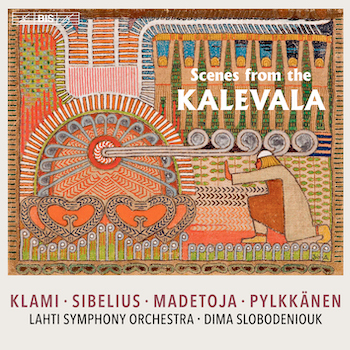Classical Album Review: “Scenes from the Kalevala”
By Jonathan Blumhofer
This disc highlights various, early-20th-century works inspired by the Kalevala, the Finnish creation epic. It is a fantastic demonstration of creative programming and invigorating orchestral performance.

The Lahti Symphony Orchestra (LSO) and music director Dima Slobodeniouk may fly a bit under the radar these days – but they shouldn’t. Their new album, Scenes from the Kalevala, may help change that; regardless, it’s a fantastic demonstration of creative programming and invigorating orchestral performance.
In essence, the disc’s concept is to highlight various, early-20th-century works inspired by the Kalevala, the Finnish creation epic first comprehensively compiled during the 19th century. Jean Sibelius’s various Kalevala-influenced scores alone could comprise a multi-volume study of the subject. But Slobodeniouk and his forces only draw on one of them – and that in a version previously unrecorded.
Otherwise, the album focuses on contributions from Finnish composers who otherwise languished under Sibelius’s long shadow.
Leevi Madetoja was one of the Great Man’s students and Madetoja’s 1913 symphonic poem, Kullervo, demonstrates some of the challenges of following in his imposing footsteps. The piece is late-Romantic in character, though not so sumptuous as anything by Strauss or quite as inventive as, say, Night Ride and Sunrise.
Still, Madetoja’s thematic ideas are all laid our clearly and orchestrated with immediacy. The most striking sequence comes via an excellent episode for lyrical strings that is interrupted by galloping brass tattoos. Throughout, Madetoja’s attention to rhythmic schemes also pays dividends: much of the music’s power and build-up of tension derives from these shifting patterns.
Uumo Klami’s 1943 Kalevala Suite, on the other hand, is firmly rooted in the 20th century. Here, though, the composer’s debts to Stravinsky (and, to a lesser extent, Ravel) are sometimes distracting. For all the inherent oddness and unpredictability of colors and rhythms in the opening “Creation of the Earth,” for instance, allusions to The Rite of Spring and Bolero are unmistakable. The Firebird crops up in the gently dancing “Terhenniemi” while Rite makes a reappearance in the concluding “The Forging of the Sampo.”
Rather more impressive are the delicate textures of “The Sprout of Spring” and the gentle dissonances of the “Cradle Song for Lemminkäinen.” And, even if “Terhenniemi” doesn’t impress for originality, its xylophone-clarinet duet and the lush little waltz around its mid-section certainly charm.
Less derivative is Tauno Pylkkänen’s 1942 Kullervo Goes to War. Imbued with a good bit of swagger – its outer thirds offer no shortage of color or rhythmic verve – as well as moments of reflective lyricism, what the piece lacks in harmonic adventurousness it makes up for with engaging orchestrations and a strong dramatic shape.
Even so, the most striking inclusion on the album is the 1897 version of Sibelius’s Lemminkäinen in Tuonela. Aside from a few small cuts and alternations to the orchestration, not too much differs in this edition from the final 1939 publication.
Even so, for freshness of texture, atmosphere, and mood, the thirty-two-year-old Sibelius was already, evidently, a master and the LSO’s performance ably draws out the music’s weirdness (the piece describes the visit of the mother of the Kalevala’s hero, Lemminkäinen, to recover his body from the realm of the dead) and urgency.
The disc’s other performances want nothing for balance, pacing, and vigor, especially the Madetoja and Pylkkänen selections. As usual, Bis’s engineering is natural and resonant.
Additionally, Kimmo Korhonen’s liner notes are deeply informative, managing to concisely discuss the Kalevala’s origins and significance while also providing flawless introductions to these obscure composers and pieces. In a word: it’s a masterpiece of note writing.
Jonathan Blumhofer is a composer and violist who has been active in the greater Boston area since 2004. His music has received numerous awards and been performed by various ensembles, including the American Composers Orchestra, Kiev Philharmonic, Camerata Chicago, Xanthos Ensemble, and Juventas New Music Group. Since receiving his doctorate from Boston University in 2010, Jon has taught at Clark University, Worcester Polytechnic Institute, and online for the University of Phoenix, in addition to writing music criticism for the Worcester Telegram & Gazette.
Tagged: Bis, Dima Slobodeniouk, Finland, Kalevala, Kimmo Korhonen, Scenes from the Kalevala

[…] Classical Album Review: “Scenes from the Kalevala” https://artsfuse.org/242102/classical-album-review-scenes-from-the-kalevala/ […]